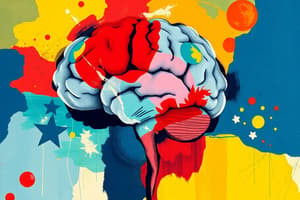Podcast
Questions and Answers
What does Hull refer to as the state of tension or arousal caused by biological or physiological needs?
What does Hull refer to as the state of tension or arousal caused by biological or physiological needs?
- Reward
- Motivation
- Equilibrium
- Drive (correct)
According to Hull, organisms will avoid repeating behaviors that reduce drives.
According to Hull, organisms will avoid repeating behaviors that reduce drives.
False (B)
Name two examples of drives as mentioned in Hull's theory.
Name two examples of drives as mentioned in Hull's theory.
Thirst and hunger
Hull suggested that learning is influenced by the ways that __________ are perceived.
Hull suggested that learning is influenced by the ways that __________ are perceived.
Match the following groups with their reward criteria during the study:
Match the following groups with their reward criteria during the study:
What does Hull-Spence's view of discrimination learning primarily involve?
What does Hull-Spence's view of discrimination learning primarily involve?
Cognitivism emphasizes that mental processes are irrelevant to learning.
Cognitivism emphasizes that mental processes are irrelevant to learning.
List the three stages of discrimination learning according to Hull-Spence.
List the three stages of discrimination learning according to Hull-Spence.
Cognitivism replaced __________ in the 1960s as the dominant paradigm in psychology.
Cognitivism replaced __________ in the 1960s as the dominant paradigm in psychology.
Match the following cognitive theories to their associations:
Match the following cognitive theories to their associations:
Flashcards are hidden until you start studying
Study Notes
Cognitive Psychology
- Cognitive psychology studies the mind and how it obtains, processes and stores information
- Cognitive psychologists challenge the limitations of behaviorism in its focus on observable behavior.
- Learners are active participants in their learning, and the mind functions like a computer processor.
Behaviorism
- Learning theories propounded by the behaviorists are mechanical processes of associating stimuli with responses, resulting in new behavior
- The learner starts as "tabula rasa", behavior is shaped by "reinforcement."
- Behaviorists viewed the learner as a passive person who responds to external stimuli.
Cognitive Psychology and Behaviorism
- Cognitive psychology derives in part from earlier traditions of thought and problem solving, while behaviorism focuses on observable behavior
- Cognitive psychologists incorporate mental structures and processes into their learning theories.
- Behaviorists use the metaphor of the mind as a computer, information is processed and leads to certain outcomes
Cognitivism
- Cognitivism is a theory that emphasizes the active mental processing of information
- Cognitivism is associated with "Information Processing", "Artificial Intelligence", and "Linguistic"
- Two major components of cognitivism are theoretical and methodological
- Cognitivists believed that "mental processes" are essential for learning to take place and that thinking is not a behavior by itself.
Learning Theories
- Thorndike's Connectionism theory suggests that learning is about creating associations between stimuli and responses.
- Tolman's Latent Learning Theory suggests that learning can occur without reinforcement and is often demonstrated when a reward is introduced.
- Gestalt Psychology emphasizes the importance of perception and how the mind organizes information into meaningful patterns.
- Jean Piaget's Cognitive Development Theory details how children's thinking develops in stages through interaction with their environment.
- Vygotsky's Sociocultural Theory places importance on the influence of social interaction and cultural context on learning.
- Bruner's Theory of Cognitive Development suggests that learning is an active process of constructing meaning and understanding the world.
- Bandura's Social Cognitive Learning Theory emphasizes the role of observation and imitation in learning.
- Ausubel's Subsumption Theory suggests that new learning is connected to existing knowledge structures.
Constructivism
- Constructivism views learning as a process in which the learner actively constructs or builds understanding.
- John Dewey, Maria Montessori, and David Kolb served as the foundation of constructivist learning theory.
- Constructivism is opposed to the objectivist position that the mind can stand separate and independent from the body.
Hull – Spence Learning
- Hull – Spence viewed discrimination learning as developing in three stages:
- Conditioned excitation develops to the SD
- Conditioned inhibition develops to the 𝑆 ∆
- Conditioned Excitation and Inhibition have generalization gradients
Drive Theory
- Clark Hull believed that all motivation arises as a result of biological needs
- Hull used the term "drive" to refer to the state of tension caused by biological needs.
Cognitive Psychology Continued
- Cognitive psychology adopts a positivist approach and the belief that psychology can be fully explained through experiment, measurement, and scientific methods.
- Cognitive psychology is reductionist in its goal to identify and understand the individual components of mental functions.
- Cognition consists of discrete, internal mental states whose manipulation can be described in terms of rules or algorithms.
Studying That Suits You
Use AI to generate personalized quizzes and flashcards to suit your learning preferences.




